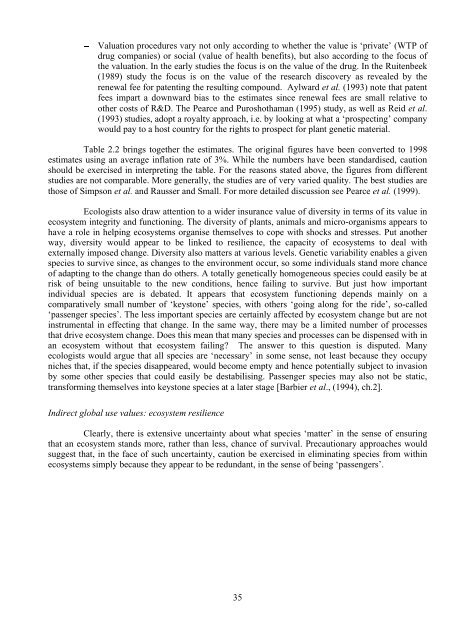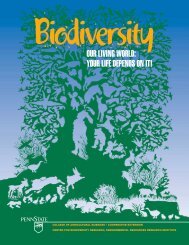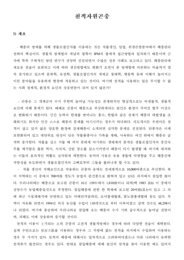Valuation of Biodiversity Benefits (OECD)
Valuation of Biodiversity Benefits (OECD)
Valuation of Biodiversity Benefits (OECD)
- No tags were found...
You also want an ePaper? Increase the reach of your titles
YUMPU automatically turns print PDFs into web optimized ePapers that Google loves.
- <strong>Valuation</strong> procedures vary not only according to whether the value is ‘private’ (WTP <strong>of</strong>drug companies) or social (value <strong>of</strong> health benefits), but also according to the focus <strong>of</strong>the valuation. In the early studies the focus is on the value <strong>of</strong> the drug. In the Ruitenbeek(1989) study the focus is on the value <strong>of</strong> the research discovery as revealed by therenewal fee for patenting the resulting compound. Aylward et al. (1993) note that patentfees impart a downward bias to the estimates since renewal fees are small relative toother costs <strong>of</strong> R&D. The Pearce and Puroshothaman (1995) study, as well as Reid et al.(1993) studies, adopt a royalty approach, i.e. by looking at what a ‘prospecting’ companywould pay to a host country for the rights to prospect for plant genetic material.Table 2.2 brings together the estimates. The original figures have been converted to 1998estimates using an average inflation rate <strong>of</strong> 3%. While the numbers have been standardised, cautionshould be exercised in interpreting the table. For the reasons stated above, the figures from differentstudies are not comparable. More generally, the studies are <strong>of</strong> very varied quality. The best studies arethose <strong>of</strong> Simpson et al. and Rausser and Small. For more detailed discussion see Pearce et al. (1999).Ecologists also draw attention to a wider insurance value <strong>of</strong> diversity in terms <strong>of</strong> its value inecosystem integrity and functioning. The diversity <strong>of</strong> plants, animals and micro-organisms appears tohave a role in helping ecosystems organise themselves to cope with shocks and stresses. Put anotherway, diversity would appear to be linked to resilience, the capacity <strong>of</strong> ecosystems to deal withexternally imposed change. Diversity also matters at various levels. Genetic variability enables a givenspecies to survive since, as changes to the environment occur, so some individuals stand more chance<strong>of</strong> adapting to the change than do others. A totally genetically homogeneous species could easily be atrisk <strong>of</strong> being unsuitable to the new conditions, hence failing to survive. But just how importantindividual species are is debated. It appears that ecosystem functioning depends mainly on acomparatively small number <strong>of</strong> ‘keystone’ species, with others ‘going along for the ride’, so-called‘passenger species’. The less important species are certainly affected by ecosystem change but are notinstrumental in effecting that change. In the same way, there may be a limited number <strong>of</strong> processesthat drive ecosystem change. Does this mean that many species and processes can be dispensed with inan ecosystem without that ecosystem failing? The answer to this question is disputed. Manyecologists would argue that all species are ‘necessary’ in some sense, not least because they occupyniches that, if the species disappeared, would become empty and hence potentially subject to invasionby some other species that could easily be destabilising. Passenger species may also not be static,transforming themselves into keystone species at a later stage [Barbier et al., (1994), ch.2].Indirect global use values: ecosystem resilienceClearly, there is extensive uncertainty about what species ‘matter’ in the sense <strong>of</strong> ensuringthat an ecosystem stands more, rather than less, chance <strong>of</strong> survival. Precautionary approaches wouldsuggest that, in the face <strong>of</strong> such uncertainty, caution be exercised in eliminating species from withinecosystems simply because they appear to be redundant, in the sense <strong>of</strong> being ‘passengers’.35












